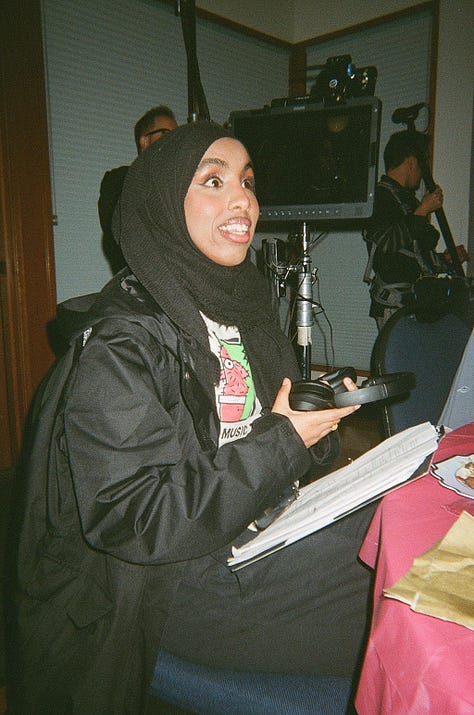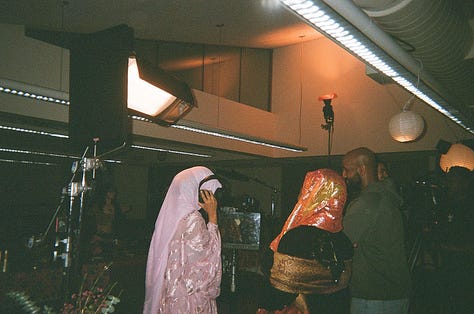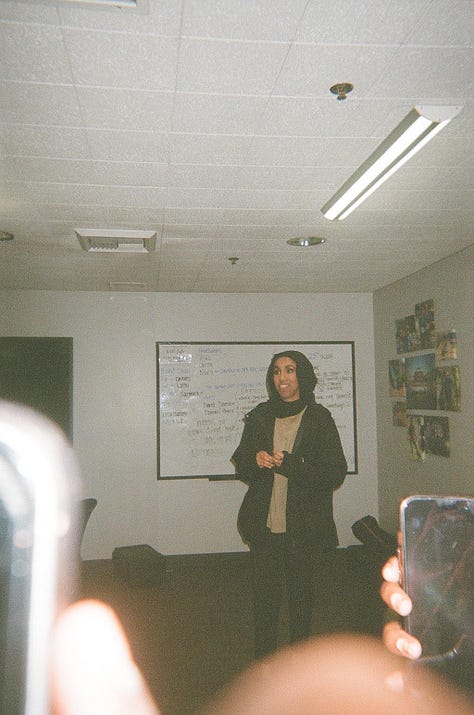#KillintheGame: Creating Art that Mirrors Life with Mawahib Ismail
I sat down with Mawahib Ismail- friend, director, producer, and screenwriter. We discussed her short film "Hooyo Macaan" and her journey through screenwriting.
Mawahib Ismail- The Somali- American creative that creates art that amplifies voices and answers questions
Dede Stewart: So you were born and raised in Seattle, Washington. What do you think Seattle has taught you?
Mawahib Ismail: I think the one thing that Seattle has taught me is probably acceptance of self. Not because Seattle is a pro-Muslim or pro-Black area, but there is no lane or universe for me to exist in. So, I had to accept myself. I had to accept that I am who I am and love the things that I love and I’l do the things that I love because no one else was going to do it for me. That sounds sad but it’s also like a “silver lining” thing because it taught me to be happy and grateful for who I am because there’s no one else like me. That sounds so corny ugh [rolls eyes jokingly]
Dede Stewart: It gave you that sense of self. Thats amazing that it could give you that because when I lived in Seattle, I feel like it “broke me down to build me back up.”
Mawahib Ismail: Oh it definitely broke me down [laughs]. I think before coming to New York, I was able to [develop] a strong sense of self which I think was very important. I think Seattle’s “lack” gave me that.
Dede Stewart: We love that! So[your film]“Hooyo Maacan” is about Samira, a recent college graduate who is battling some “mommy issues”. Why was this story so important to tell?
Photo from "Hooyo Macaan"
Mawahib Ismail: I think for copious reasons. 1) In the intergenerational sense- there’s no Somali-American stories that are told by Somali- American people. I actually got into writing and directing because I was auditioning for this Apple TV series called “Little America” and I was so close to getting it because it was right before they were filming and they hadn’t told me “no”. I called up my advisor, big up Nancy Sisko at UW, and I told her “Draft up those drop-out papers, mama. I’m going to be an actor…Imma be in SAG!” I didn’t get [the role]. I was like “Where else am I going to audition? There is no one else looking for Somali talent.” So I [decided] to write and direct stories that I wanted to see and act in. 2) I was reckoning with what it meant to be a daughter. I was 21 about to be 22 when I wrote it [which] is the age when my mom became a mom. I don’t know why, but that was always at the forefront of my mind throughout that year. I would be going to class and be thinking “my mother was in her second trimester.”
I was in a screenwriting class with my professor, Warren Ethridge. He teaches the class in “nuggets” which is basically what you and your protagonist are going through. He always starts out class with “Am I_____?” He was throwing out this idea of “Am I wanted?”. I don’t know what came over me because I raised my hand and just started going on this whole solilioquy about how our parents had to expedite their life. I assume my mom wanted to be a mom and a wife, but it was expedited. I don’t think she was expecting that at 22. She had dreams and she had things that she wanted to do and I think about what she was thinking about at ages 6 or 7 when she was playing with her dolls. [I wonder] did she think about me or my siblings? Did she think about this scenario? I know my parents love me and would do anything in the world for me but do they ever have nights where they would compare and contrast what life is now and what it could've been? I’m like spiraling [in this class] at like 9 AM in this basement in UW. I’m almost sobbing and everyone’s probably thinking “this girl has lost it.” Right before I left, my professor told me that I should write it so I wrote it. I wasn’t interested in writing it or directing it, but we did a table read of it with like 100 people. People were responding really well to the script so he said that I should direct it. That’s kind of how it came about, not because I wanted to do it but for a class.
Mawahib Ismail- The screenwriter and director
Dede Stewart: That was an amazing story. So, this is now your 3rd film. You said that you wrote and directed this film. How was that process? How was this process compared to your other 2 films?
Mawahib Ismail: The first one I ever did was a short documentary.It was about Black student activists. I was Vice President of UW’s BSU for 2 years and I’ve been involved in BSU since I was a toddler it feels like. So that was a pretty easy entry point as a filmmaker because I had so much contextual knowledge of what it means to be a Black student leader emotionally and logistically. The second movie I co-produced…I feel like eldest daughters of African households would be great at producing because its just project management and managing emotions all day. That came to me very naturally and I love elevating other creative’s ideas and letting them have a space to shine. I had the opportunity to hire my friends on this project which was amazing.
Photo from 18.ths
For writing and directing, I think that’s the only way I would be able to direct.I always say that writing and directing feels like, and I don’t mean to be sacrilegious, writing the Bible and also being the prophet of the Bible. It feels like writing this very important text that everyone will reference but you’re also leading that word.
Dede Stewart: When can we expect to see “Hooyo Macaan?”
Mawahib Ismail: I mean, that is up to film festivals. I am most excited for these film festivals because I get to make films more accessible to Black and Somali people. Seeing Somali people light up when I tell them about “Hooyo Macaan”,it's the best thing ever.
Dede Stewart: Do you have any advice for other first-generation filmmakers who want to get their story out there?
Mawahib Ismail:I think alot of white people give advice like “Just do it.” That’s very unrealistic [advice] especially for us first-generation filmmakers. It’s more about putting time into your craft which sucks because we don’t really have the resources. Alot of us still have 9-5’s so its hard work. Unfortunately, you’re gonna do things for free. You have to get that tangible experience. If you can, [you should] make the short film and raise the money yourself because you [acquire] skills that those white girlies with daddy’s trust fund don’t have. Take yourself as seriously as you should be taken.



It all goes back to my professor, Warren Ethridge,he’s the one who drilled “I’m a filmmaker”into my head. There’s this Regina Hall quote that I love so much. She said it during her speech at the 2017 or 2018 Black Girls Rock Award Show.
“Behind every Black Girl Magic is White Man Power.”
-Regina Hall
Mawahib Ismail- The Dreamer
Dede Stewart: What would you say to little Mawahib, who had all these dreams and saw all these colors?
Mawahib Ismail: I would say “If you have the desire and if it’s in your heart, it’s yours.” For such a long time, I would wait for other people to tell me that I’m on the right path or that I’m doing the right thing. But now I know that it is mine.
Photo from ‘"Hooyo Macaan" film




